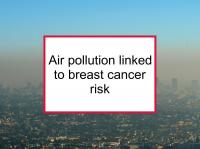Occupational studies have reported associations between breast cancer and exposure to certain chemicals that are also found in urban air. Several studies covering limited geographic areas have reported that the incidence of breast cancer appears to be higher in areas with high levels of air pollution.
Now an extensive Canadian study has reported a link between exposure to traffic-related air pollution and breast cancer development, especially premenopausal breast cancer.
Latest research finds link between air pollution and breast cancer
The Canadian study referenced at the beginning of this news story was designed to investigate the association between long-term exposure to traffic-related air pollution and the incidence of breast cancer. To conduct the study, the authors estimated average exposure to NO2 using three different methods. Proximity to major roads was also included in the analysis.
The air pollution data was combined with breast cancer data from the National Enhanced Cancer Surveillance System, a population-based case-control study that included eight of Canada's 10 provinces from 1994 to 1997.
The study included 1,569 women who developed breast cancer and 1,872 cancer-free controls. Positive associations were found between breast cancer and all three measures of NO2 exposure over the period 1975 to 1994. A 10 ppb (parts-per-billion) increase in NO2 exposure was associated with approximately 30% higher risk of breast cancer. When the breast cancer cases were divided according to menopausal status at diagnosis, the results did not reach statistical significance for postmenopausal breast cancer.
In addition, the results were not consistent across all eight provinces and the association between air pollution and breast cancer risk was lower when the analysis was restricted to women who had undergone routine screening mammograms. No links were found between breast cancer and road proximity, a surprising result.
The authors conclude that the results indicate that traffic-related air pollution might be associated with the development of breast cancer, particularly in premenopausal women. Further research is clearly needed, according to the authors.
